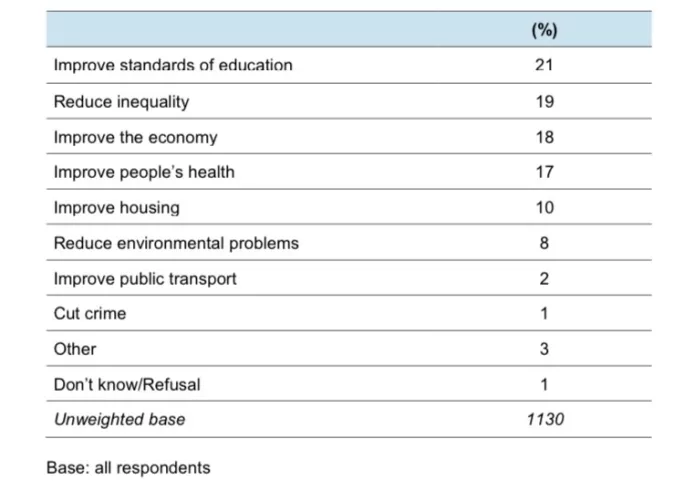Top of the Scottish public’s list of policy priorities for government action is improving standards of education, new research shows.
Just over one in five participants in the latest Scottish Social Attitudes (SSA) report on attitudes to government, published today, said the Scottish government’s highest priority should be improving education standards.
Some 19 per cent said the government should reduce inequality, while 18 per cent said that the government should prioritise improving the economy and 17 per cent thought that the top priority should be improving people’s health.
Priorities for government action 2021-22
The latest survey, which is funded by the Scottish government, also shows that most people (64 per cent) think the level of taxation and spending on health, education and social benefits should be increased. Some 32 per cent think the level of taxation and spending should stay the same and 3 per cent think it should decrease.
The 2019-20 iteration of the survey found that “improve standards of education” (18 per cent) was the second-most popular priority for the government after “help the economy grow” (23 per cent).
Education is top priority for Scottish public
Typically, the survey finds that priorities vary considerably depending on age, gender and political and social values - and the latest results are no exception.
Today’s report states: “While 20 per cent of those aged 45-54 and 65 and over, and 28 per cent of those aged 55-64 identified ‘improving the economy’ as their highest priority, just 10 per cent of those aged 16-34 did so. Meanwhile, at 30 per cent, those aged 16-34 were more likely than their counterparts in all other age groups to point to the reduction of inequality as their number one priority.”
It adds: “Political and social values also appeared to shape public priorities for government action. While 31 per cent of those on the right identified improving standards of education as their highest priority, just 13 per cent of their more left-wing counterparts did so.”
Those on the left identified improving people’s health as their top priority (16 per cent).
The SSA survey has been tracking changes in people’s social, political and moral attitudes in Scotland since 1999. It is run by NatCen Social Research, and the 2021-22 survey is based on interviews with 1,130 randomly selected people.
Today’s publication reports the findings from the survey’s core module, which focuses on attitudes to government, the economy and public services.
An earlier SSA study - based on data collected from over 1,300 people largely online and published in June - focused on attitudes towards Gaelic.
It found that those in favour of children in Scotland being taught Gaelic as a school subject for an hour or two a week had increased from 38 per cent in 2012 to 55 per cent in 2021.
The survey also found that 37 per cent were in favour of Gaelic-medium schools, 38 per cent were neither in favour nor against and 25 per cent were against them.
Earlier this year a Tes Scotland investigation explored how much progress had been made in rolling out Gaelic-medium education.





